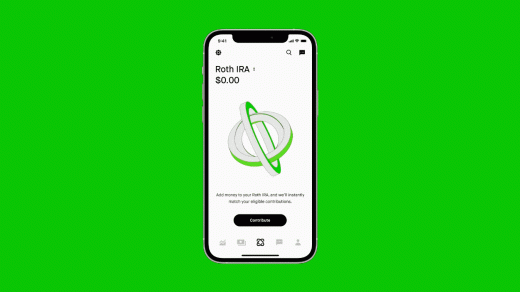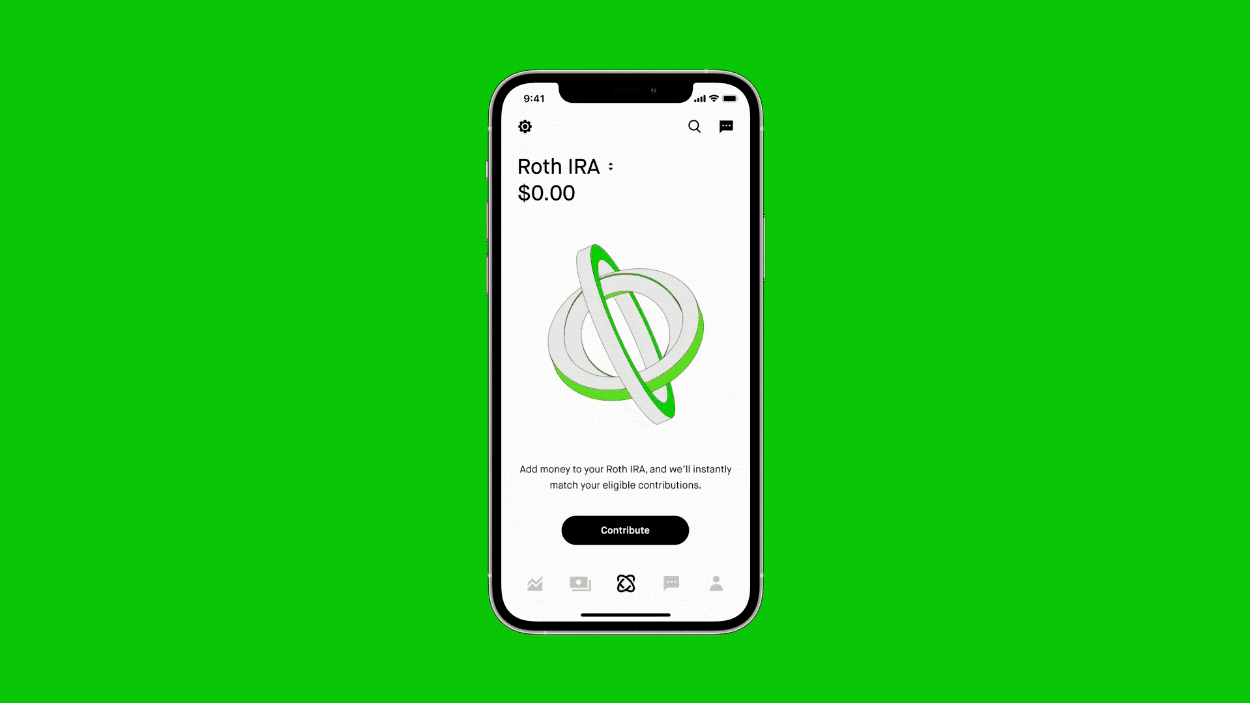Robinhood launches retirement savings accounts
Stock trading app Robinhood wants its users to start planning for retirement. The San Francisco-based company announced today that it’s launching retirement accounts, allowing day traders and others to start saving via IRAs and Roth IRAs, a move that puts the platform in more direct competition with traditional brokerages.
The new retirement accounts will let users invest in stocks and exchange-traded funds (ETFs). Robinhood does not require an account minimum to get started and will not take commissions on investments nor charge a management fee, as some other robo-advisors do. It also announced that it will match 1% of every dollar contributed to its accounts. (For an IRA, which has an annual contribution limit of $6,000, that would yield a maximum match of $60.) The company has opened a waitlist for the program, which will launch in the coming weeks and will be available to all customers in the next few months.
Robinhood says that it’s using the match to appeal to gig workers, in particular. “43% of our customers are in the gig economy,” says Robinhood’s chief brokerage officer Steve Quirk, who previously worked at TD Ameritrade. “For them, there is no 401K, there is no match, there is no retirement unless they’re doing it on their own. [Gig workers] want to pick when they retire, they want to be able to do things on their own terms.”
The service will use an intuitive, mobile-based setup to get customers started on their retirement accounts. Users will be asked to rate their comfort level with risky investments; Robinhood will then provide them with some initial advice on stocks and ETFs, based on their profile and appetite for risk. Once those steps are completed, they can begin investing.
The retirement accounts, which are similar to the kind of robo-advisor services already offered by Charles Schwab and Fidelity, are the latest gambit by Robinhood to attract customers back to its platform amid a market downturn. Other features the company has launched to round out its portfolio include a Web3 wallet, extended trading hours, and a debit card.
Since the height of the meme-stocks craze in January 2021, Robinhood has seen a steady decline in monthly active users. In September, the company reported that it had 12.2 million active users, down from 18.9 million in the same quarter of 2021. In May, the company cut 23% of its staff amid a 35% decline in users.
Robinhood still earns the bulk of its revenue from trades, through a practice called payment for order flow (PFOF). In essence, Robinhood makes money by routing trades to brokers. The more trades made on the app, the more money the company takes in.
It’s this lopsided incentive system, in part, that has given the company a reputation for enabling risky investment strategies. Robinhood Retirement does have some safeguards: A banner message on-screen alerts users to the risk of investing. The company also sprinkles links throughout the app to additional information about investments to help users stay informed. Quirk acknowledges that Robinhood has a reputation as a platform for day trading, an image that it’s working to shed. “We try to do what we can to make sure that we remove the things that we think are gonna be most dangerous,” he says, “and after that, you know, it’s sort of up to [users] to make their decisions.”
Some of Robinhood’s other initiatives haven’t worked out well for customers. Bloomberg reported in November that a feature that let users purchase shares in companies about to go public—including Sweetgreen and Allbirds—led to big customer losses. The project seems to be on pause.
Indeed, Robinhood has repeatedly run up against regulators—and angered customers—over the past few years. It paid a $65 million fine to the Securities and Exchange Commission (SEC) in 2020 for not disclosing its PFOF business model, costing its customers millions by not routing trades to brokerages with the best price. It was fined another $70 million in July 2021 for misleading customers. and system outages that locked them out of their accounts at volatile times in the market. New York regulators also penalized the company $30 million in August for not taking adequate cybersecurity measures to protect its crypto wallet. And Robinhood is facing a class-action lawsuit for halting trades during the GameStop and meme-stock frenzy in January 2021.
All along, critics have dinged the company for gamifying the act of picking and trading stocks, to the detriment of its users. Now, the company wants them to trade futures as well as their future.
(26)



